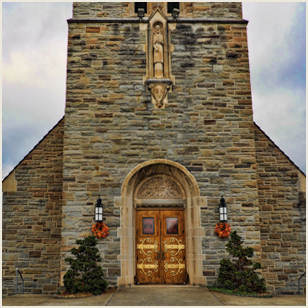Eucharist, Page: Quotes, Quote Topic
Material food first changes into the one who eats it, and then, as a consequence, restores to him lost strength and increases his vitality. Spiritual food, on the other hand, changes the person who eats it into itself. Thus the effect proper to this Sacrament [of the Eucharist] is the conversion of a man into Christ, so that he may no longer live, but Christ lives in him; consequently, it has the double effect of restoring the spiritual strength he had lost by his sins and defects, and of increasing the strength of his virtues.
–Saint Thomas Aquinas (1225-1274)
Eucharist, Page: Quotes, Quote Topic
Do not think that because He ascended to heaven that you have been forgotten, because you cannot be both loved and forgotten. He left you the greatest pledge that He had when He ascended there, namely the canopy of his precious flesh in memory of His love.
–Saint John of Ávila (1500-1569)
Cross, Eucharist, Page: Quotes, Quote Topic
For the salvation of all of us in general, our Lord could not have given Himself more than He did on the Cross; and He cannot give Himself to each one of us in particular more than He has done in the Eucharist.
–Reginald Garrigou-Lagrange (1877–1964)
Eucharist, Page: Quotes, Quote Topic
In Communion, the Savior draws us and gives Himself, not only to humanity in general, but to each one of us if we wish it, and in an ever more intimate manner if we are faithful.
–Reginald Garrigou-Lagrange
Eucharist, Page: Quotes, Quote Topic
Communion ought to incorporate us more and more into Christ, by increasing our humility, faith, confidence, and especially our charity, in order to make our hearts like to that of the Savior who died out of love for us.
— Reginald Garrigou-Lagrange OP (1877–1964)
Eucharist, Page: Quotes, Quote Topic, Spiritual (life)
We feed as on the food of life, we constantly refresh our souls with his precious blood, as from a fountain. Yet we are always thirsting, burning to be satisfied. But he himself is present for those who thirst and in his goodness invites them to the feast day. Our Savior repeats his words: “If anyone thirsts, let him come to me and drink.” He quenched the thirst not only of those who came to him then. Whenever anyone seeks him he is freely admitted to the presence of the savior. The grace of the feast is not restricted to one occasion. Its rays of glory never set. It is always at hand to enlighten the mind of those who desire it.
–Saint Athanasius the Great (c. 296-373)

